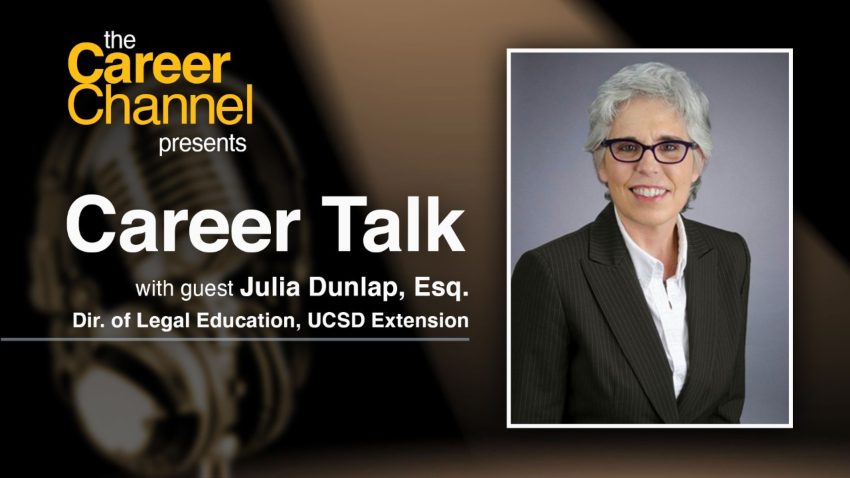By Debra D. Bass

A conversation about the changing role of paralegals.
Career choices aren’t always logical or linear, explains Julia Dunlap, director of business, legal and safety programs at UC San Diego Extension. She uses herself as an example.
“In the 80s, everyone was going into business,” according to Dunlap, and there was indeed a boom in business majors inspired by the lucrative MBA (masters in business administration) pipeline to six-figure salaries in finance.
But after an accounting class, Dunlap said that she just wasn’t excited by the major, so she switched to English.
It didn’t hold the same promise of an exorbitant salary after graduation, but it fulfilled her in a way that made her studies worthwhile. However, after graduating from UC Berkeley with an English degree, she said she had no idea what to do next.
 Teaching was the obvious answer, but teaching didn’t stoke her passion...at least not at the time.
Teaching was the obvious answer, but teaching didn’t stoke her passion...at least not at the time.
Dunlap ended up going to law school. She settled into a family law practice because it was more flexible and stimulating than pursuing a career in corporate law. To this day, Dunlap is licensed to practice in California and Federal courts, but her small part-time practice specializing in estate planning.
She explains that things have changed a lot since her days in law school. The nature of legal research has evolved and grown infinitely more complex. And many responsibilities have shifted to paralegals, who need new competencies and more acumen than ever before.
Prior to the 1990s, paralegals were largely unskilled. There were no strict requirements. Their administrative duties were largely clerical and pretty restricted. Salaries were also low to match the occupation’s skill level. Today, paralegals earn an average of nearly $60,000 (including bonuses), according to the National Association of Legal Assistants.
“Paralegals now get a lot more respect from attorneys because they have to have faith that the paralegals they hire can do similar work to the attorney and do it well,” said Dunlap, past president of American Association for Paralegal Education. “The attorney is ultimately responsible for anyone who works for them. So, writing a motion or doing legal analysis may be done by a paralegal, but it has to be up to attorney standards because it’s the attorney’s reputation on the line.”
Dunlap said that in addition to handling some things that were previously solely reserved for lawyers, paralegals also need to be digital detectives. They must be experts in finding things that are hidden electronically, or often reviving documents and financial records that have been deleted.
The changes have put a lot more responsibility on the role of the paralegal, but as a result it’s also a viable and financially stable career for professionals with an interest in the law, but not perhaps an interest in law school.
 By 2001, California had adopted one of the strongest requirements in the nation. In addition to technology skills, specific education requirements and mandatory continuing education, training in the state of California prepares paralegals to work anywhere in the country.
By 2001, California had adopted one of the strongest requirements in the nation. In addition to technology skills, specific education requirements and mandatory continuing education, training in the state of California prepares paralegals to work anywhere in the country.
Dunlap noted that the benefits of a California certification are evident in the diversity of students who sign up for classes with Extension’s program. Many would-be paralegals train here with UC San Diego Extension’s American Bar Association-approved accelerated program in order to practice in other states. The Extension program is now celebrating its 30th year of ABA approval.
She said that some people find it surprising that paralegals are called to do everything from designing persuasive trial demonstrations for court demonstrations to learning new software to mine metadata.
“Technology skills are in heavy demand,” Dunlap said. “There are a lot of new systems and computer programs, and attorneys don’t necessarily have the time to learn new technology or they don’t want to.”
That makes a paralegal all the more valuable, she said.
Asked to give advice to those interested in pursuing a paralegal certification, she had five recommendations:
- Attend a meeting of the paralegal association. Network with people in the field and figure out if it fits your interests and abilities.
- “This next one I say jokingly, but the hardest part is working with attorneys,” said Dunlap, who said that she points the finger at herself as well. Some lawyers are dealing with very serious legal issues that could cost someone their liberty or access to their children or destroy their financial future. Being deadline driven and detail-orientated is a must, but that means that criticism can be harsh if standards are not met. “I tell people that you have to have a strong personality of your own to deal with a profession that tends to attract strong personalities.”
- You can work for yourself as a legal representative in some states doing family law cases. The limited license legal technician is a fairly new field of law that doesn’t operate under a supervising lawyer. The LLLT requires a stronger legal background than a paralegal, but they are not lawyers, and as the name suggests, they operate in a limited capacity.
- Be flexible and open to learning. “Do your research,” said Dunlap, who is teaching legal research. “As with everything, the paralegal profession is constantly changing.”
- Paralegal may be where you begin, but not necessarily the end. “I encourage and welcome people to make an appointment to talk to me about the field,” Dunlap said. “I think it’s great preparation before law school.”
Learn more about the Paralegal programs and find the program right for you. Now offered online/remotely.